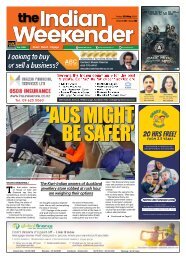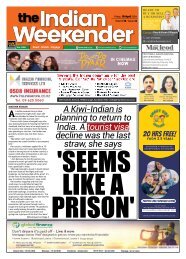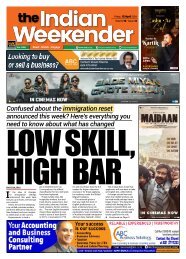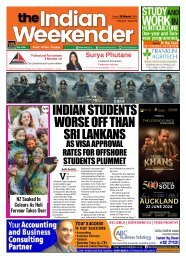The Indian Weekender, Friday 18 September 2020
It seems that the government’s understanding about the core issue of Indian marriage based partnership visa and INZ’s operational understanding of dealing with it are not aligned.
It seems that the government’s understanding about the core issue of Indian marriage based partnership visa and INZ’s operational understanding of dealing with it are not aligned.
- No tags were found...
You also want an ePaper? Increase the reach of your titles
YUMPU automatically turns print PDFs into web optimized ePapers that Google loves.
<strong>The</strong> <strong>Indian</strong> <strong>Weekender</strong> <strong>Friday</strong>, <strong>September</strong> <strong>18</strong>, <strong>2020</strong><br />
NEW ZEALAND 5<br />
Covid-19: GDP results show NZ<br />
officially in first recession in a decade<br />
RADIO NEW ZEALAND<br />
<strong>The</strong> economy has shrunk by<br />
a record amount and fell<br />
into its first recession in<br />
a decade as it was battered by the<br />
government’s moves to eliminate<br />
Covid-19, but it will already be on<br />
the road to recovery.<br />
Official numbers show gross<br />
domestic product (GDP) fell a<br />
seasonally adjusted 12.2 percent for<br />
the three months to June.<br />
It followed a revised 1.4 percent<br />
fall in the first quarter and was the<br />
biggest fall since the current system<br />
of measuring data was introduced in<br />
1987.<br />
“Industries like retail,<br />
accommodation and restaurants, and<br />
transport saw significant declines in<br />
production because they were most<br />
directly affected by the international<br />
travel ban and strict nation-wide<br />
lockdown,” Stats NZ senior manager<br />
Paul Pascoe said.<br />
<strong>The</strong> consensus of forecasts was for<br />
a fall of between 12-13 percent, but<br />
the Reserve Bank forecast more than<br />
14 percent and Treasury 16 percent.<br />
Service industries fell by 10.9<br />
percent, with consumer spending<br />
falling more than 25 percent, but<br />
there were double digit falls for<br />
manufacturing, and construction.<br />
<strong>The</strong> economy shrank by 12.4<br />
percent on the same quarter a year<br />
ago, while the annual average growth<br />
rate fell to 2 percent. Finance Minister<br />
Grant Robertson said the sharp<br />
economic decline was no surprise,<br />
but the government’s measures such<br />
as the wage subsidy, business loans,<br />
and other schemes had cushioned the<br />
impact and laid the foundation for<br />
the rebound.<br />
“Going hard and early means<br />
that we can come back faster and<br />
stronger. Economists expect the<br />
current <strong>September</strong> quarter to show<br />
a record jump back to growth in the<br />
economy.” Opposition parties were<br />
quick to jump on the numbers as an<br />
example of government failure.<br />
“<strong>The</strong> lack of pragmatism and a<br />
clear plan from Labour has made<br />
the economic hole deeper and the<br />
impact harder than it needed to be,”<br />
National finance spokesperson Paul<br />
Goldsmith said.<br />
ACT leader David Seymour said<br />
the government had allowed the<br />
economy to fall off a cliff and created<br />
a mountain of debt. But economists<br />
had already moved on from the data,<br />
which many regarded as ‘ancient<br />
history’.<br />
“<strong>The</strong>re is little point getting hung<br />
up on Q2 numbers. <strong>The</strong>re is likely<br />
to be major revisions to the numbers<br />
by StatsNZ as new information<br />
comes to hand,” said Kiwibank chief<br />
economist Jarrod Kerr.<br />
“Activity that was halted during<br />
the lockdown, particularly across<br />
traditional services, was not<br />
necessarily cancelled activity but<br />
rather deferred.”<br />
Kerr said the downturn was the<br />
one “we had to have” and it has<br />
offered a range of opportunities to<br />
transform the economy and set it<br />
on a different growth path, but this<br />
would mean it would need to keep<br />
spending and investing. Economists<br />
are forecasting a rebound of as much<br />
as 10 percent in the current quarter to<br />
the end of <strong>September</strong>, which would<br />
be the end of the recession.<br />
But uncertainties surrounding<br />
Covid-19 and border closure look<br />
set to keep business investment<br />
and household spending subdued,<br />
meaning the actual hit to the economy<br />
will persist for much longer.<br />
New Zealand’s growth slump was<br />
worse than Australia’s 7 percent<br />
and the US 9.1 percent fall, but was<br />
close to contractions in Canada and<br />
most of Europe, and much better<br />
than the UK’s 20.4 percent decline.<br />
Financial markets were unmoved by<br />
the numbers.<br />
Authorised by G Hamilton, 41 Pipitea Street, Wellington.<br />
Strong Team.<br />
More Jobs.<br />
Better Economy.


















